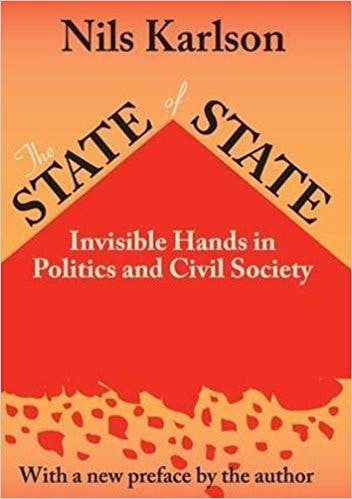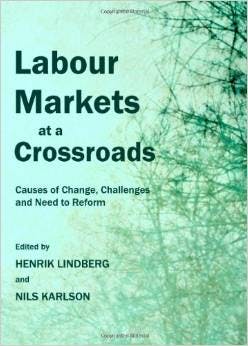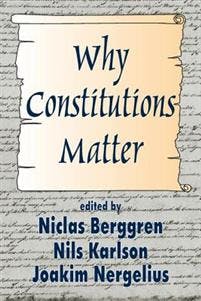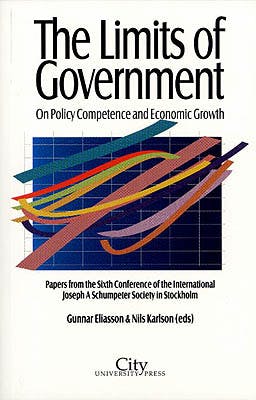Publications by Nils Karlson
Karlson, Nils, The state of state: an inquiry concerning the role of invisible hands in politics and civil society, Univ., Diss. Uppsala : Univ.,Uppsala, 1993
One of the most astonishing features of social, economic, and political life is that large-scale patterns, structures, and behavioral regularities sometimes develop without anyone intentionally planning their occurrence, or without anyone deliberately working to bring them about. They evolve as a specific kind of unintended consequence of human action. They are the result of invisible hands. Building on Adam Smith’s classic concept of ”the invisible hand,” this study presents a general approach, based on the theory of games and evolutionary theory, to explain such large-scale unintended consequences within markets, communities, and the state.

Karlson, Nils, Norek, Mikolaj & Wennberg, Karl (red.), Virtues in entrepreneurship, Ratio, Stockholm, 2015
Does virtuous behavior contribute to business success? And is virtues ethics a superior alternative to corporate social responsibility in business ethics? This volume combines empirical and theoretical contributions from a range of different contexts on the role of virtues in entrepreneurship. It show the contemporary relevance of virtue theory in analyzing markets as well as business development. Virtues may be regarded as a kind of competencies, which are essential in an entrepreneurial society. This bears consequences for how we educate future business leaders, but also for how economists and policymakers should look on markets and for-profit firms.A special introduction is written by Professor Deirdre McCloskey.The editors, Nils Karlson, Mikolaj Norek and Karl Wennberg, are all affiliated with the Ratio Institute in Stockholm, Sweden.

Lindberg, Henrik & Karlson, Nils (red.), Labour markets at a crossroads: causes of change, challenges and need to reform, Cambridge Scholars, Newcastle upon Tyne, 2012
In the research project ”Wage formation and business dynamics” at the Ratio Institute a new book has been published edited by Nils Karlson and Henrik Lindberg. In Labour Markets at a crossroads: Causes of Change, Challenges and Need to Reform (2012) we investigate the vital aspects of the different Labour Markets Models in Europe. In ten chapters with three themes: Flexicurity and Labour market Dynamics, Unions and Industrial Action, Wages and Bargaining, different aspects and dimensions of the challenges that Europe face are addressed. The challenges are a persistent and furthermore increasing unemployment among the young, immigrants and disabled which calls for reform of the existing institutions.

Karlson, Nils (red.), Eight prizes that changed the world: the Sveriges Riksbank prize in economic sciences in memory of Alfred Nobel to members of the Mont Pelerin Society, Ratio Institute, Stockholm, 2009
Ideas have the potential of changing the world for the better. This was the fundamental insight of Alfred Nobel when he created the Nobel Prize – to those who have conferred the greatest benefit on mankind. The same kind of understanding motivated the foundation of the Mont Pelerin Society in 1947. The objective was to facilitate an exchange of ideas between like-minded scholars in hope of strengthening the principles and practice of a free society and market-oriented economic systems.
This book, Wight Prixes that Changed The World, presents the prize lectures of the members of the Mont Pelerin Society who, so farm have received The Sveriges Riksbank Prize in Economic Sciences in Memory of Alfred Nobel.
The Laureates are Friedrich A. Hayek, Milton Friedman, George J. Stigler, James M. Buchanan, Maurice Allais, Ronald H. Coase, Gary Z. Becker and Vernon L. Smith. Their Ideas and scholarly production are of fundamental importance.

Berggren, Niclas, Karlson, Nils & Nergelius, Joakim (red.), Why constitutions matter, Transaction, New Brunswick, N.J., 2002
This volume, compiled under the direction of the City University of Stockholm, is an important study on the significance of constitutions and constitutional law in a democratic society. A number of scholars in law, political science, and economics have contributed to this volume. They include: James Buchanan, Aleksander Peczenik, Mats Lundstrom, Joakim Nergelius, Sverker Hard, Niclas Berggren, Peter Kurrild-Klitgaard, Wolfgang Kasper, and Erik Moberg. All add to the understanding of the intertwining roles of politics and the social sciences in a modern democratic state.
They explore why a constitution is essential; the relationship between a constitution and a rational political system; the democratic principle of majority rule; why constitutional constraints are needed in a democratic state; recent constitutional reforms in the United Kingdom; the electoral system and its centrality in a democracy; evolution in constitutional change; competition within a federal structure; and the connection between politics and economics. Why Constitutions Matter is a fascinating and timely study of constitutionalism, and will be of interest to students of politics, law, economics, and sociology.

Allen, David, Eliasson, Gunnar & Karlson, Nils (red.), The limits of government: on policy competence and economic growth : papers from the sixth conference of the international Joseph A Schumpeter society in Stockholm, City Univ. Press, Stockholm, 1998
